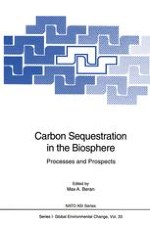1995 | OriginalPaper | Buchkapitel
Carbon Sequestration in Wetland Ecosystems: A Case Study
verfasst von : Bert G. Drake
Erschienen in: Carbon Sequestration in the Biosphere
Verlag: Springer Berlin Heidelberg
Enthalten in: Professional Book Archive
Aktivieren Sie unsere intelligente Suche, um passende Fachinhalte oder Patente zu finden.
Wählen Sie Textabschnitte aus um mit Künstlicher Intelligenz passenden Patente zu finden. powered by
Markieren Sie Textabschnitte, um KI-gestützt weitere passende Inhalte zu finden. powered by
Wetlands occupy a significant part of the land surface of the globe. In addition to acting as sinks for carbon, wetlands will respond to rising atmospheric CO2 and climate change in various ways. Rising sea level and increasing storm frequency are expected to cause deterioration of coastal wetlands while rising atmospheric CO2 and rising temperature may increase primary production, carbon sequestration and increased emission of methane in marshes dominated by C3 vegetation.A brackish wetland on Chesapeake Bay, Maryland has been the subject of a long-term study of the response to elevated CO2. In this study, carbon sequestration depended mainly on the direct effects of elevated CO2 on ecosystem photosynthesis and respiration and most of the additional carbon accumulated into fine roots, the decay of which increased soil carbon. The addition of carbon to the sediments altered biogeochemical cycles, evidence of which was increased nitrogen fixation and methane production. Elevated CO2 significantly increased the rate of photosynthesis while causing a reduction in the concentration of soluble protein, primarily the carboxylating enzyme, Rubisco, which caused a significant redistribution of nitrogen by decreasing the amount of N in green photosynthetic tissue aboveground and increasing it in roots and rhizomes belowground. The increased C:N had important consequences for plant/insect interactions as well as decomposition. One of the most significant findings was that elevated CO2 reduced mitochondrial respiration, probably through a mechanism which involves a direct effect of CO2 on the activity of certain key enzymes controlling the rate of respiration.This study suggests that rising atmospheric CO2 will alter fundamental processes at all levels of organization in wetlands and presents us with the challenge to understand the mechanisms by which rising atmospheric CO2 regulates carbon balance in plants and ecosystems.
